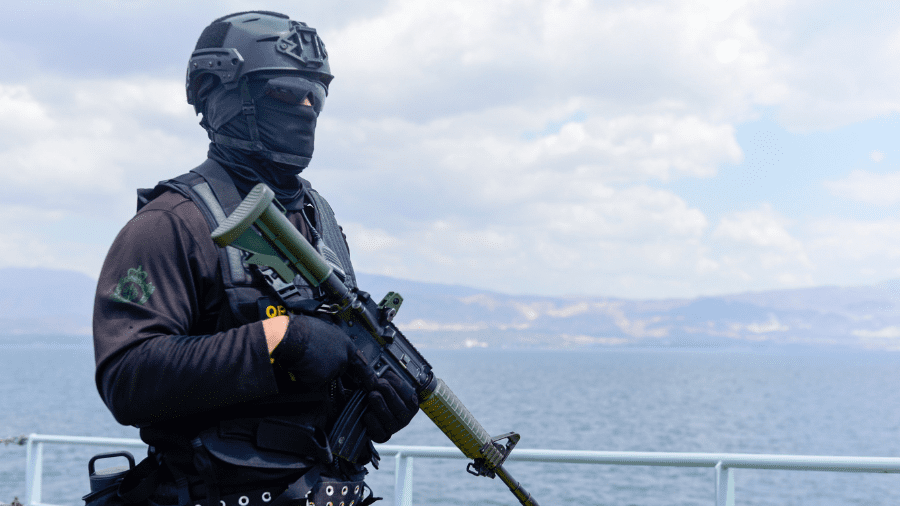This article originally appeared in the Hub.
By Richard Shimooka, April 24, 2023
Discussions on foreign and defence policy over the past few years have largely been focused on Canada’s position in an era of growing great power conflict. A constant point of discussion is what are the country’s core national interests, how should it approach them, and what resources should be provided to achieve them. A good place to think about these questions is Haiti, a country where Canada has a surprisingly long history supporting stabilization and rehabilitation efforts.
Between 1989 and 2004, the Canadian Armed Forces (CAF) undertook a dozen operations in Haiti, many running concurrently, which included humanitarian assistance/disaster relief, a naval blockade, and other measures, in an attempt to stabilize the country after political unrest. Haiti was long been viewed as an exceptionally vexing foreign-policy challenge within the government—one briefing note from 1994 described the situation as a “no-win fiasco.” Still, Ottawa prioritized the stabilization of the country and employed a range of foreign policy instruments to do so.
Canada’s interest in Haiti rests on a number of factors. The most significant is the large Haitian diaspora within Canada, though the state was also seen as important for the overall regional stability. Building a stable, democratic and prosperous state that respects the rule of law is a key part of this – a large exodus of refugees could overwhelm many smaller Caribbean states that do not have the resources to assist them. But Ottawa’s involvement in Haiti is not solely based on Canada’s direct national interests. Rather its involvement has occurred in many instances in lockstep and/or at the direct behest of the United States government.
It should come as no surprise as Canada’s closest partner in hemispheric security shares these same views, such as the desire for regional stability and promoting democratic values and prosperity in Haiti. However, the U.S. has been reticent to become involved unilaterally in the country. Instead, successive administrations have sought to deputize Canada to play a leading role in managing crises in the country.
In the 1990s, there were a variety of reasons for this—key among them being a recalcitrant, Republican-controlled Congress that was extremely skeptical of UN operations, particularly after the 1993 debacle in Somalia. Moreover, the United States military was stretched across a wide number of worldwide contingencies. Thus, engaging regional partners to assist with security in their neighbourhood is valued by the U.S. as a form of burden-sharing. Canada is also seen to have a number of major advantages: a relatively strong bilateral relationship with Haiti, and bilingual diplomats, aid workers, and soldiers who can easily interact with local populations.
In the past, Canada willingly assumed this mantle. In 1996, the United Nations faced a significant shortfall of forces in the country to help oversee an upcoming election in part due to political and budget constraints. Consequently, Ottawa launched Operation Standard, reinforcing the peacekeeping mission with an additional 750 soldiers, and financed contributions without recourse to UN funding. Canada made the commitment despite the military’s concurrent deployment of over 1,000 soldiers to help oversee the Dayton Accords in the former Yugoslavia.
However, Canada’s response went beyond just military means. It had real diplomatic heft. For example, the prime minister’s foreign and defence policy adviser, James Bartleman, and U.S. National Security Advisor Tony Lake were together in Haiti to negotiate with key officials on the ground to help stop a potential descent into further violence. The joint effort, coming on the heels of Operation Standard, illustrated the strong bilateral relationship the two countries enjoyed and the respect Canada once garnered. Fast forward 27 years to today and the difference is stark.
Recent media reports have suggested that once again the U.S. government has implored Canada to provide a greater role in addressing the worsening political climate in Haiti after the assassination of its president Jovenel Moïse in July 2021, another major earthquake and years of stagnating development. A half-dozen major criminal gangs have emerged and effectively wrested effective control over significant parts of the country. These groups are increasingly sophisticated in their activities and are connected to transnational networks to facilitate their operations, which the government is ill-equipped to manage. Even the Haitian government has directly requested Canadian assistance, as the recent discord leaks in the U.S. have revealed.
Yet, unlike in 1996, Canada has largely refused to intervene in the conflict or even play a strong role. Instead, Ottawa has gamely provided some armoured vehicles to support the Haitian police forces, as well as financial aid. There is a reasonable argument to be made that the situation is intractable and that a Canadian military intervention may not be appropriate. Indeed, the government has constantly reiterated that any solution must come from within Haiti.
At the same time, it is also accurate to observe that this response illustrates the relative atrophy of Canada’s foreign policy capabilities over the past two decades. Rather than being a key hemispheric player in the region, Ottawa is effectively relegated to a secondary role.
A significant factor behind this diminution is the overall neglect of the CAF. The reconstitution order illustrates this best. As with 1996, Canada’s primary focus is in Europe, though now on supporting NATO allies in a potential escalation of conflict with Russia. Thus, it maintains a brigade group of approximately 2000 soldiers on higher readiness and preparation to be deployed to the region. Beyond this commitment, Canada is effectively unable to sustain any additional operations at this time without serious consequences for the rest of the forces.
Canada’s lacking response goes beyond military instruments, it is absent in a substantial diplomatic fashion, especially compared to 1996. It is clear that the Biden administration desires Canada to take a more active role in Haiti and the region, and previous prime ministers saw Canada’s involvement as important to its interests. Yet this government has effectively avoided taking any major role; its only response has been to practise a form of chequebook diplomacy—basically, providing $100 million in security funding.
Given the current state of the CAF, and the decades long-process to rehabilitate them, these situations will become increasingly common in the future. With its limited military capabilities, countries are increasingly viewing Ottawa as irrelevant. This diminution will have serious consequences not just for this country, but also others in need internationally—as we can witness today in Haiti.
Richard Shimooka is a Senior Fellow at the Macdonald Laurier Institute. He previously held fellowship positions at the Conference Defence Associations Institute, and Queen’s University’s Center for International Relations and the Defence Management Studies Program.






